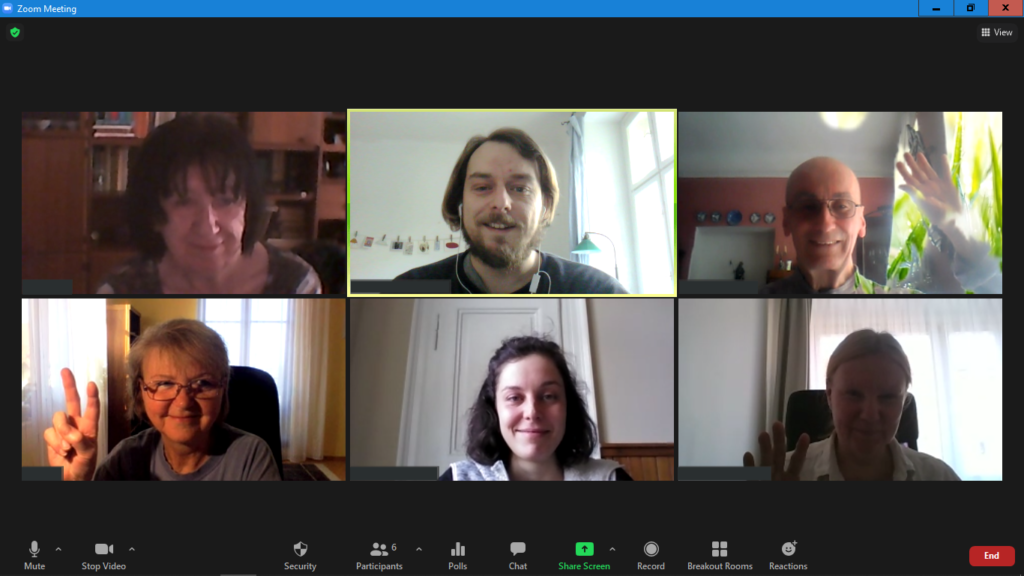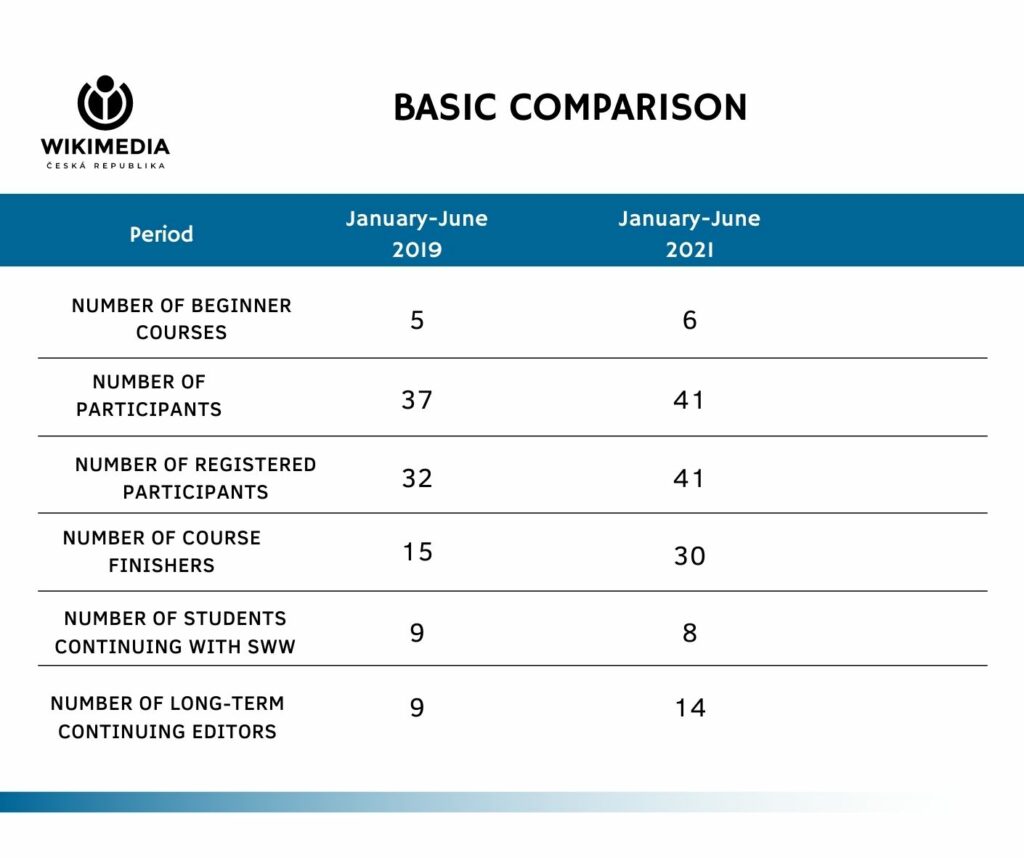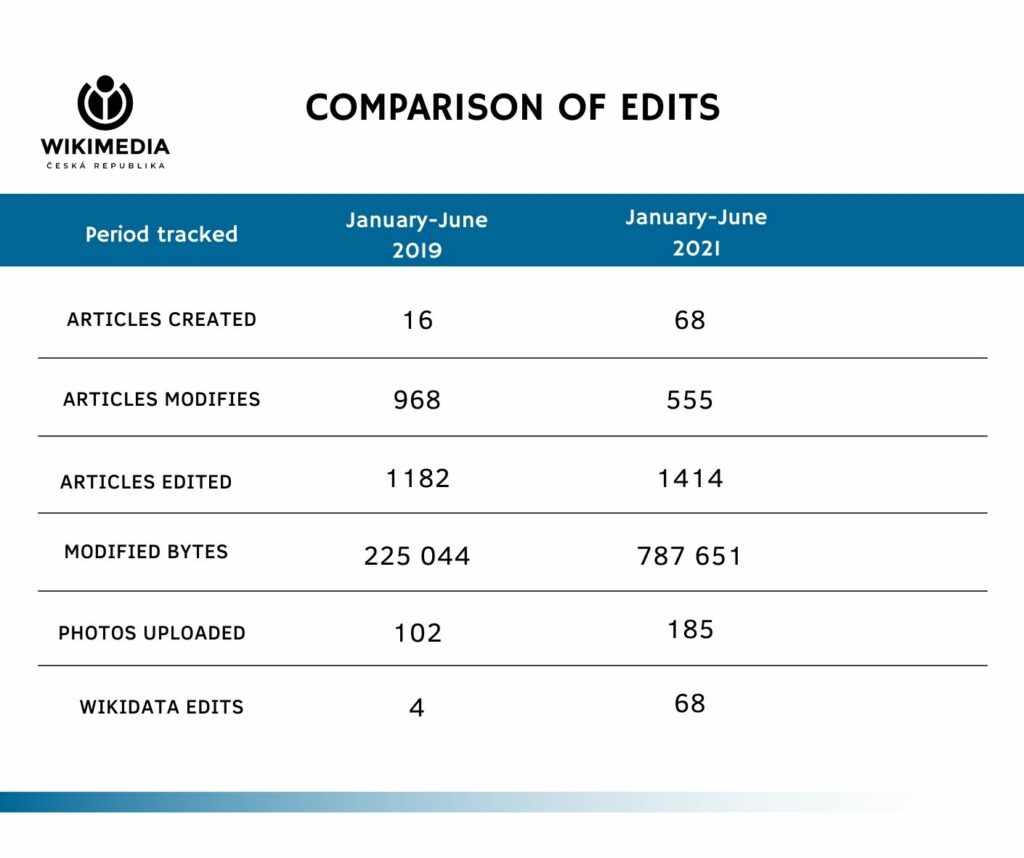When Seniors Write Wikipedia Online
We have been teaching seniors how to write Wikipedia for many years, and our proven method has always been regular face-to-face meetings, mostly in the computer rooms of Czech libraries. The coronavirus pandemic brought about a forced transition to the online environment and concerns about how participants would cope. Is it possible to teach seniors remotely? And how did the participants in this year’s online courses fare compared to before the pandemic?

For the year 2020, we had a number of courses prepared as part of the Seniors Write Wikipedia programme, one of the educational programmes of Wikimedia CZ. The rapid onset of the pandemic and the subsequent lockdowns were a shock to everyone and it took us some time to adapt to the situation. We had to cancel the courses prepared for the spring and only a minority of our participants and even trainers dared to switch to the online version. Online meetings have some obvious disadvantages. Physical contact and socialising elements have always been very important for senior participants, perhaps even more so than in other age groups. And for less computer-savvy seniors, the presence of a trainer in the classroom is an important encouragement. All of this gets quite complicated in the online version. But there are advantages. Participating from the comfort of one‘ s home is a huge relief for many older people because they don’t have to make the difficult commute. In addition, we are opening up our classes to regions where no classes have been held before.
In 2020, during the first few online courses, we learned how to run Wikipedia writing courses remotely. Gradually, the interest of seniors grew – perhaps related to them gaining more confidence from e.g. the online classes of the Universities of the Third Age, but also due to the extension of lockdowns, where Wikipedia work could be a welcome escape from an otherwise stereotypical day. By the beginning of 2021, interest in online courses had exceeded our expectations, and during the first half of the year we had comparable numbers of participants and courses as before the pandemic. That in itself is great news.
But let’s now see if online courses can really replace the basic „offline“ option in terms of long-term results. Let’s compare the first half of 2019, when there were 5 classic beginner courses, with the first half of 2021, when there were 6 online beginner courses (we left 2020 out of the comparison because there were far fewer courses and we were still learning how to do them).

In the first half of 2019 there were 5 courses for beginners: in Havířov, Pilsen, Brno and two in Prague. In contrast, 6 online courses were held in the first half of 2021. These were attended mostly by people from Prague, often also from Brno and Liberec, but also from all other parts of the country, frequently from places where courses are not normally held.
Further comparison shows that we are seeing a similar number of participants in both periods (37 vs. 41). The first difference we see is in the number of registered participants. 5 people from the 2019 course did not create a Wikipedia account at all, which in practice means that they left the course after the first lesson. Such „dropouts“ are normal for any course, but interestingly, there were no dropouts for the online courses. Of course, with such small samples there is a large effect of chance (which will also be true for all subsequent analyses), but a possible explanation is that only the more computer-savvy participants dare to take online courses, and then they are also less likely to drop out after the first lesson.
The greatest difference in this comparison is seen in the number of completers (i.e., those who have completed the entire course: they have attended more or less all six sessions and mastered the core material), where the success rate of offline learners is 41% compared to 73% in online courses. Again, the greater general computer proficiency of participants from the online courses offers an explanation, but such a large difference could easily be due to some other, unmeasurable factors.
The penultimate parameter focuses on the longer-term potential of the course completers, which is one of the main goals of the courses: to „nurture“ new, independent Wikipedians. 9 of the 2019 completers continued in our senior program: 6 continued with the advanced course, 3 preferred to repeat the beginner course once more, in the fall of 2019. These 9 continuers out of the 15 completers (and 37 participants at the beginning) are very respectable numbers. In contrast, we have 8 continuing participants from the first half of 2021: 6 through the advanced course, 3 through the Commons course, and 3 through participation in Senior WikiCity (some continued in multiple activities, so the total is higher than 8). 8 out of 30 completers is not such a great result anymore, on the other hand, it is to be expected that some of this year’s completers have not even had the opportunity to participate in continuing activities (2019 completers are two years ahead) and will „reactivate“ in the future.
The last parameter tracks the long-term potential of completers, like the previous parameter, but not through participation in other courses, but through real editing on Wikipedia. We could refer to this parameter as long-term retention or „survivals“. We tracked which participants in the beginner courses from the first half of 2019 continued to edit after the courses, specifically from July 2019 onwards. According to the results, we can see that this is 9 out of 32 registered participants. 5 of these 9 last edited in the second half of 2019, 1 in 2020 and 3 in 2021. Thus, with a gap of two years, less than 10% of the participants (3 out of the initial 37) have permanently retained their Wikipedia presence. At first glance, this seems like a bad result, but on the other hand, in the context of the general success rate of newcomers to Wikipedia, and even compared to our other training programs (which are often not primarily aimed at educating new Wikipedians), these are still very good numbers.
The 2021 group of „online“ course participants has the following results: 14 of the 41 registered participants have edited since July 2021 onwards. Of these, 3 most recently in July, 1 in August, 2 in September, 3 in October and 5 in November. This makes, with a gap of less than half a year, a success rate of more than a third, which is a great result.
This parameter is probably the best indicator of how many participants actually continue editing. The numbers above show that seniors from this year’s online courses are not doing worse, on the contrary, they are doing much better. The small size of the overall data makes it impossible to draw strong general conclusions, but by all accounts the online courses seem to be working very well.

In addition to the characteristics of the participants, we can also compare the results of their work. In this case, we will only focus on editing during the periods when the courses were running and the participants were starting out on Wikipedia (we will therefore not track the results of their possible long-term editing, but such data would certainly be interesting).
The data above (calculated by Event Metrics) shows quite a big difference. The 37 registered participants of the 2019 courses created a total of 16 new articles between January and June 2019, compared to 68 articles from the 41 participants of 2021. However, the „offline“ course participants did better in the number of edited articles (968 vs. 555) and the number of edits is more or less balanced. However, the number of bytes changed suggests that the total volume of content added is significantly in favour of the „online“ course participants, as is the number of photos uploaded and edits on Wikidata. So again, at least from a quantitative point of view, the online course participants performed better.
Conclusions
Of course, it is difficult to draw general conclusions: with such small amounts of data, it often depends on one or two individuals who can multiply the total numbers by several times by their significant activity. The influence of chance (especially in the sense of how able and motivated the participants are that year) and other factors is also certainly crucial, but there is much to be gleaned from the numbers and the conclusion that online courses for seniors can, under favourable conditions, produce comparable or even better results than traditional courses. The success rate of online courses may, as already mentioned, be due to the fact that more computer-savvy seniors may, on average, venture into an online course (which is not to say that some participants do not have serious difficulties in going online; to address these difficulties, we have, for example, introduced lesson zero to check the functionality of the technology or offered extra telephone support).
This year we also managed to organize a number of follow-up activities. In addition to the six beginner courses from the first half of the year, there were 3 advanced courses (with 27 participants), 2 Commons courses (with 17 participants) and a WikiGap Editathon (with 4 participants). The course completers also made use of the online Wikiporada services. The culmination was a weekend event in September, Senior WikiCity (with 10 participants, 3 of whom were newcomers). The involvement of newcomers in these follow-up activities is both a testament to the success of the beginner courses and a guarantee of more sustainable results.
And what do these results actually look like in non-numerical terms? Take a look for example at the valuable archive photos by Mr. Broukal. Thanks to this year’s courses, he has uploaded images of actors he took many years ago to Commons. And if you’ve made it this far in this article full of statistics, you’ll be happy to read about the history of the pie chart in the wiki article „Pie Chart“ by our participant JanaJin. Cheers to senior writing!
Would you like to support seniors in writing on Wikipedia? Become a patron of the Seniors Write Wikipedia project!

